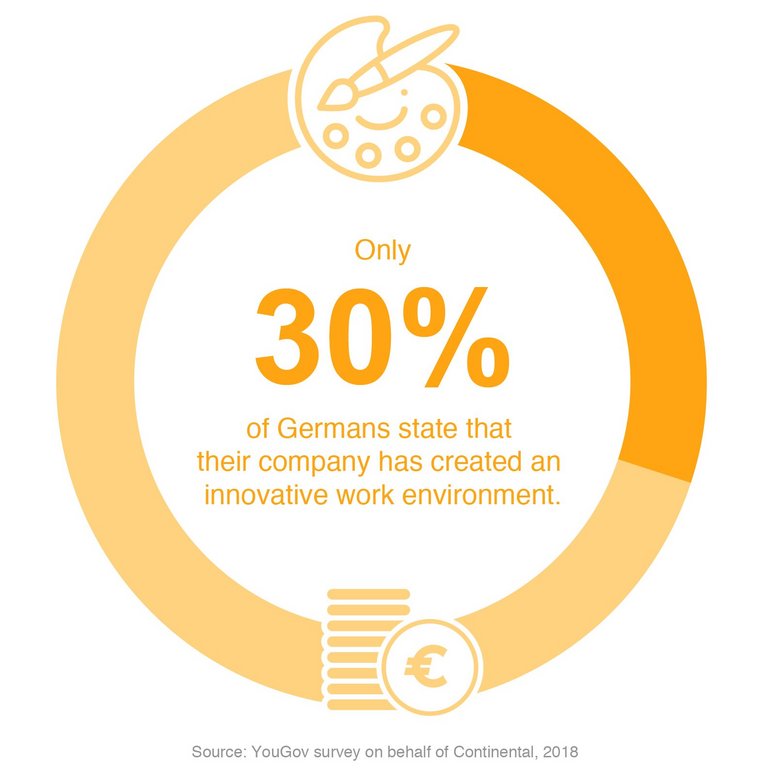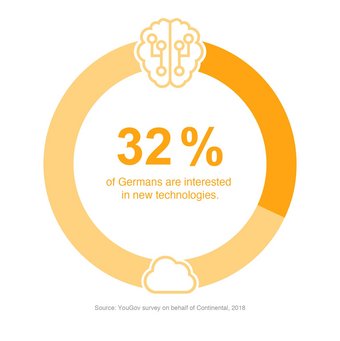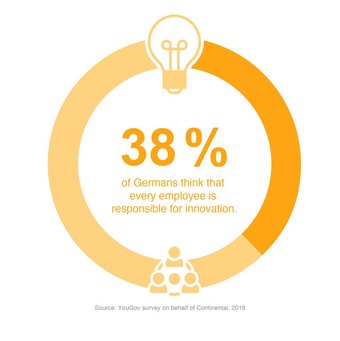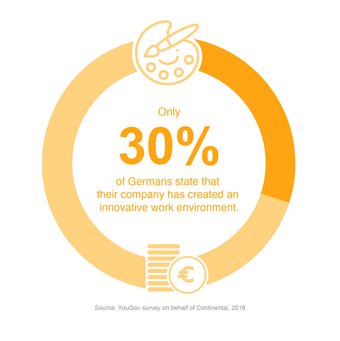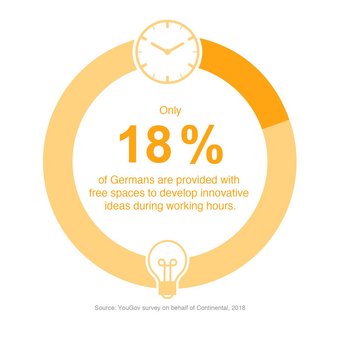International Survey on Innovation Culture: German Companies are Losing Ground
- Continental presents survey results on innovation culture in Germany, the US, Japan and China
- The U.S.A. and China are the clear leaders in innovation culture
- Only very few companies in Germany have implemented specific measures to promote innovation
- Dr. Ariane Reinhart, Executive Board Member for Human Relations: “Companies need to create a culture in which employees are willing to not only embrace change but also actively promote it”
- Continental, for example, promotes innovation through agile, team-oriented leadership, diversity, flexible working models and its own startup program
Hanover, August 27, 2018. The technology company Continental has published a new representative, four-country survey highlighting the extent to which employees in Germany, China, Japan and the U.S.A. recognize the importance of innovations. When it comes to innovation culture, however, the study reveals a number of shortcomings. In this country, for example, the working environment in many companies is not considered to be conducive to innovation. Although German employees are interested in new technologies and see innovation as a task for all employees, few companies have so far implemented specific measures to promote innovation. Only 30% of German respondents feel that their working environment promotes innovation; in Japan, this figure is as low as 21%. By international standards, the US (45%) and China (54%) are the clear leaders when it comes to innovation culture.
On behalf of Continental, the market and opinion research institute YouGov surveyed 4,500 employees over 18 years of age in Germany, the U.S.A., China and Japan. The study was carried out online in July 2018. The results are representative for the group of employees.
In contrast to many German organizations, the technology company Continental recognized early on that innovation is a key success factor in the digitalized world of work – and that it is our own employees who are driving precisely these innovations. “To secure the company’s long-term success, companies need to create a culture in which employees are willing to not only embrace change but also actively promote it,” said Dr. Ariane Reinhart, Executive Board Member for Human Relations at Continental.
Reinhart is concerned about the findings of the survey on innovation culture in German companies: “The results are worrying. Without a strong innovation culture, German companies are at risk of losing ground against international companies. Digital transformation further increases the pressure to act. Thanks to the company-wide measures we have implemented here at Continental, we have over many years successfully demonstrated how, as a major international company with more than 243,000 employees, we can promote innovation in our own company, remain agile and actively involve our employees in the change.”
In doing so, the technology company focuses on four central themes: agile, team-oriented leadership based on the four corporate values; diversity; flexible working models, including for our production employees; and fresh inspiration through our very own startup program. These approaches allow Continental to cultivate not only an entrepreneurial mindset among employees but also agile methods and ways of working as well as to create the basic conditions for bringing the innovative ideas of our teams to the market.
The results of the Continental survey show that the employees surveyed recognize the importance of innovation. But it is equally clear that innovation culture is still in its infancy in many companies. Germany, the U.S.A. and Japan still have some catching up to do here.
Low interest in technology in Germany – China leads the way
A third of Germans (32%) are interested in new technologies such as collaboration tools, business apps and artificial intelligence in the company. The interest here in Germany is roughly the same as in the U.S.A. (30%) and Japan (28%). Leading the way, however, is China, where almost two thirds of respondents (63%) – twice as many as in the other three countries – are passionate about state-of-the-art technology. This reflects China's ambitions to become internationally competitive through advanced technologies and a fresh innovation drive.
Germans see innovation as a joint task of the workforce and management
Despite the rather low interest in new technologies, the German employees surveyed clearly recognized (38%) that every employee is responsible for innovation and that it should be promoted by everyone. In the US, 41% have a similar view, while in Japan and China only 17% and 25% respectively agree. 40% of Chinese workers and 36% of Japanese workers believe that management personnel and company management are responsible for innovation. Only 32% in Germany and as little as 18% in the US share this opinion.
Promoting innovation – a lack of measures in Germany
Although many employees are aware of the importance of innovation in the workplace, not enough specific measures designed to foster innovation have been implemented in the day-to-day work routine. Employees lack not only an environment in which they can work creatively and try out new things, but also the financial and technical resources needed to put their ideas and projects into practice. Only 30% of German respondents state that their company has created a working environment that is conducive to innovation; in Japan, this figure is just 21%. By contrast, more than 50% of Chinese employees and 45% of American employees state that their company offers an innovation-friendly climate.
And when it comes to specific measures designed to promote new ideas in the company, Germany is still in the starting blocks. Just 14% of respondents stated that they had received the necessary resources from their employer to implement new projects. Only 17% of respondents felt that they had the freedom to pursue innovative ideas during working hours outside of their day-to-day work, while only 9% felt that they had the opportunity to draw inspiration from external sources, for example at events. In China, however, companies are providing intensive support for their employees. Almost one in two Chinese companies (45%) support their employees in the development of new ideas by offering financial resources or technology. Respondents in one in three companies (33%) stated that their company offers a creative work environment, while 28% of employees stated that they have the opportunity to spend part of their working time on innovation projects.
Please click here for the results of the study "Change needs values: How a culture of innovation inspires change in the world of work - pdf (244KB)".

Nicole Göttlicher
Spokeswoman, Business & Corporate
Group Communications

